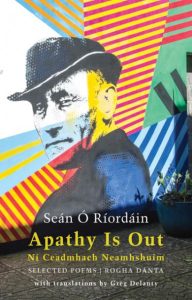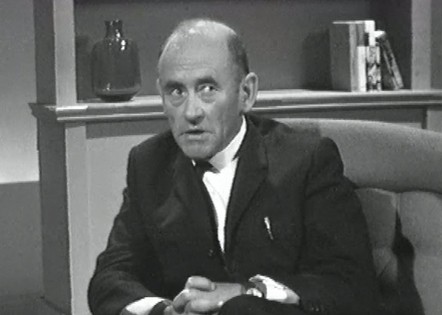Desmond Egan
Apathy Is out: Selected Poems of Seán Ó Ríordáin with translations by Greg Delanty (Bloodaxe/ClóIar-Chonnacht, £12.99/€15.00)
Seán Ó Ríordáin (1916-1977) was arguably the finest Irish-language poet of modern times. Soon after starting to work as a clerk in Cork city, he was diagnosed with TB (which had killed his father). It dogged him for the rest of his life, much of which was spent in hospital. His grappling with illness and his valiant attempts to find understanding and acceptance gave rise to some wonderful poetry.
His faith as a Catholic proved centrally important; in some respects, he could be compared to Hopkins who also grappled for belief as against a feeling of being ‘time’s eunuch’.
Ó Ríordáin’s poetry was marked by a sophisticated awareness of the literature of other countries and by the new approach of the best modernist writers, including Pound and Eliot. Ó Ríordáin only published four collections, one of them posthumous and – no doubt because of his ill-health – much of his later work tended towards short lyrical epiphanies.
He was an intense Catholic (a description which I heard Peter Kavanagh use of his brother Patrick, and which is echoed in a recent memoir). As with Hopkins and Kavanagh, Ó Ríordáin’s belief is central to his vision.
Translation
This, of course, does not preclude that doubt and questioning which Paul Tillich goes so far as to label the very condition of sincere belief.
One must begin by saluting any presentation of Ó Ríordáin’s poetry in its original Irish. Mr Delanty is clearly an admirer, anxious to spread the good news. But what of the English versions he offers in this dual-language collection? I do not know the translator who, we are told, has lived in the USA for the past 30 years, where he teaches, and who states plainly in his preface that “my Irish is poor” and necessitated his asking another Irish poet “to help me understand the poems”.

I take no pleasure in saying that these translations do poor service to Ó Ríordáin. I even question the policy of the co-publishers in allowing a selection of haphazard versions into print.
Sadly, they do little to defend a great legacy. They lack authority. They even lack the kind of scholarly investigation which one might expect. A distinguished Irish poet told me that he had “sweated blood translating Ó Ríordáin, and drank the icy waters of depression in trying to get to the bottom of his poems”.
Dilettante
It is very disappointing that Apathy Is Out shows little sign of such involvement, and more of a dilettantism often noticeable where translations from Irish are concerned.
Take, at random, The Blind Man in the Studio. The original is not without a sly knowingness: the poet as painter dealing with the complexity of the everyday. The English version we are offered misses the tone, the wit and even the very meaning of the original. One crucial line: “Is bhí an uirlís ann”/”And the instrument was available” is not even translated: the line simply omitted. The ‘river’ surprisingly and challengingly mentioned in the poem becomes a ‘bank’. The English grammar is not impressive either: ‘on to’ should be ‘onto’ (‘on’ here is not part of the verb ‘eased’).
Mr Delanty’s version tries to do, with a casualness of tone, in 15 lines what took Ó Ríordáin 16. This is shoddy work, suggestive of a careless approach to the words of a master at distilling experience into terse, evocative, lines: a poem demeaned rather than revered.
Unfortunately and sadly, a pattern has been set. The Cure provides another example of slapdash translation. Why does it start, “I was caught up in” for the simple Irish ‘caitheas’: “I spent (time)”? The next line disregards the metaphor of blood-clouds in favour of an easy alliteration: ”clouds clotted the sky”. Like clotted cream, then?
And so it goes. “Ag suirí le”: “flirting with/dabbling in” is translated “courting”. And the ending couplet – “Do thomas an fhuil ins an salachar/ Sin príomhleigheas an daoscair ar phéin” – literally, “I lowered the blood (mentioned in line 2 ) into the dirt/That’s the first remedy of vulgarity for pain” – is rendered, “I lowered myself in the usual way/the sole handy remedy for pain”. ‘Handy’!
In The Sin, “réal na gealaí”/”the sixpenny moon” becomes a shilling – a small mistake, but one indicative of a disconnectedness which typifies these translations.
A similar flippancy ruins Mr Delanty’s version of one of Ó Ríordáin’s greatest poems, Oileán Agus Oileán Eile. This fine sequence deals with the loss of the spirituality of St Finbarr and his monks (the remains of whose monastic settlement is on Gougane Barra — the ‘other’ island of the title being modern Ireland).
A contrast is offered with the simple ignorance of an Englishman out fishing. The protagonist of the poem — emblematic of contemporary Ireland — is not exempted from similar ignorance, hence that devastating conclusion, “I’ll head off, hiding the truth, like everyone/Go chattering my way through life” (my version).
Vision
Underlying the poem is a profound Catholic belief so central to Ó Ríordáin’s vision. Comparison between this version and that of Muirís Ó Ríordáin, in An Crann Faoi Bláth (Wolfhound, 1991), is instructive at least in its understanding of the theme.
Seán Ó Ríordáin’s poetry is especially difficult to translate; this is why a straightforward and erudite, even a literal version of the words would have been useful. What we get here lacks even that tone of voice which any good translation should have and which derives from humility in the face of a work of art.
Unfortunately this publication offers just another sad — and subsidised — example of the slapdash, self-indulgent casualness which is too often the lot of Irish-language poetry in translation. Apathy Is In would have been a more accurate title: the apathy of the publishers surely not excepted. And great art beaten down.
Poet Desmond Egan’s recent prose publication is Hopeful Hopkins (Goldsmith Press).


 Seán Ó Ríordaín in his last illness-haunted years.
Seán Ó Ríordaín in his last illness-haunted years. 